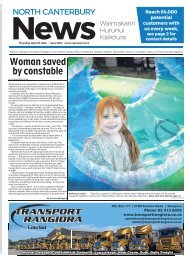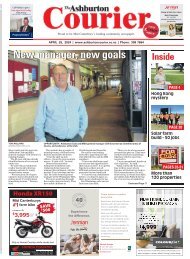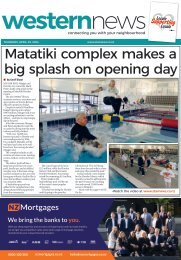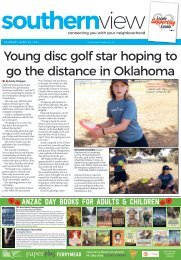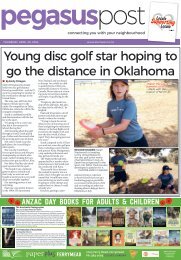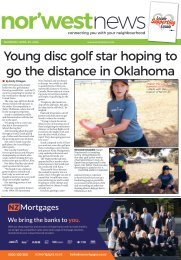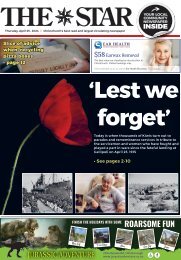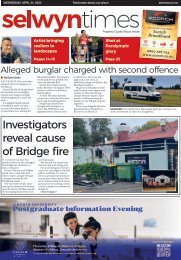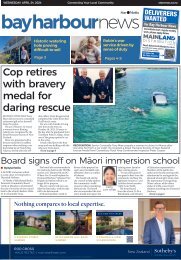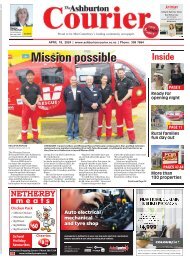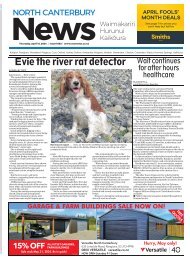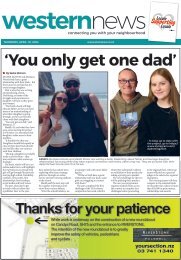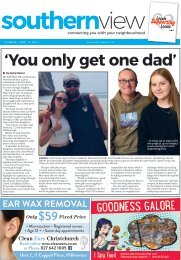You also want an ePaper? Increase the reach of your titles
YUMPU automatically turns print PDFs into web optimized ePapers that Google loves.
Wednesday <strong>February</strong> <strong>20</strong> <strong>20</strong>19<br />
Latest Christchurch news at www.star.kiwi<br />
BAY HARBOUR<br />
PAGE 7<br />
to taking Chch into the future<br />
You did a stint at the Otago<br />
Daily Times as well?<br />
I did. I was living and working<br />
in England, in Cambridge, with<br />
my then boyfriend, now husband.<br />
He’s a technology writer, we met at<br />
journalism school. There are three<br />
couples from our class and we’re<br />
all still married. My father was<br />
diagnosed with terminal cancer,<br />
my parents lived in Dunedin,<br />
so I moved back and worked at<br />
the ODT. In my last role [South<br />
Island editor-in-chief for Fairfax],<br />
I had 19 community papers in my<br />
portfolio, so I have had very close<br />
contact with community papers.<br />
When you started your career,<br />
did you ever think you would<br />
end up as an editor?<br />
No, I’m not that deliberate.<br />
Editing is an incredible privilege<br />
and amazing fun and very hard as<br />
well. I was just very fortunate to<br />
get that opportunity.<br />
Have any of your stories stuck<br />
with you over the last <strong>20</strong> years?<br />
Yes, there are some really, really<br />
powerful ones. The very first<br />
big story I covered as a junior<br />
reporter at the Dominion. I was<br />
working over Christmas and a<br />
young couple [Ben Smart and<br />
Olivia Hope] were reported<br />
missing in the Marlborough<br />
Sounds. Those stories always stick<br />
with you.<br />
Then more recently,<br />
Christchurch. It was interesting<br />
in itself, I was in Wellington<br />
when the quakes of <strong>20</strong>10 and<br />
<strong>20</strong>11 happened. We were working<br />
very closely with the team at The<br />
Press and in fact on the evening<br />
of <strong>February</strong> 22, we in Wellington<br />
helped The Press team put out that<br />
edition that landed on people’s<br />
driveways on <strong>February</strong> 23.<br />
That was pretty crazy and<br />
incredible. That night the<br />
reporters all worked, they filed<br />
their copy and we helped produce<br />
that edition of The Press from the<br />
Wellington newsroom and that<br />
next morning that Press was on<br />
people’s driveways. I used to talk<br />
about that publicly and people<br />
would cry.<br />
That’s the power of the media,<br />
it’s so important.<br />
BIG STORY: Joanna<br />
Norris’ journalism career<br />
started after being in a<br />
class with David Bain<br />
at Otago University,<br />
while the first big story<br />
she worked on was the<br />
murder of Ben Smart<br />
and Olivia Hope in<br />
Marlborough.<br />
Have you had any big<br />
fumbles?<br />
That’s the nature of news. There<br />
have definitely been things that<br />
I have reflected on later and<br />
thought we could have handled<br />
that differently, or we could have<br />
put more thought into that, or I<br />
wish we’d had more information<br />
before we published that, we<br />
would have been better off. That<br />
being said, I always describe<br />
the media as a bit of a blunt<br />
instrument, in that you wobble<br />
towards a position of truth<br />
with each iteration of a story.<br />
Journalists are not academics<br />
sitting for three years doing a<br />
thesis and producing a body<br />
of work. You work to whatever<br />
time you work to, weekly, daily<br />
or digital, you get to the truth<br />
and you hold those in power<br />
accountable.<br />
Do you miss working in the<br />
media?<br />
There’s a lot I miss about the<br />
media, absolutely. But I am<br />
also very fortunate to work<br />
with journalists right across the<br />
spectrum and that’s quite a treat<br />
as well.<br />
What do you see for the future<br />
of journalism?<br />
I have great hope for the<br />
media. I think the commercial<br />
proposition is deeply challenging<br />
and very, very difficult in a New<br />
Zealand environment where scale<br />
is a challenge. There are only five<br />
million people, there are only a<br />
certain number of consumers<br />
who are prepared to pay for a<br />
product and a limited number of<br />
advertisers.<br />
But journalism is so<br />
fundamental to a safe and strong<br />
society that there must be a<br />
way through this and I think<br />
journalism is as good now as it’s<br />
ever been.<br />
Some of the investigative work<br />
that’s done by teams across the<br />
country by all media agencies<br />
really makes a difference and<br />
it’s absolutely essential that<br />
the fourth estate keeps an eye<br />
on people in power. It has to<br />
continue.<br />
Are you surprised or<br />
disappointed by the moves made<br />
by Channel Nine in Australia to<br />
sell New Zealand assets such as<br />
The Press?<br />
No, media ownership<br />
changes, it always has done. I<br />
think when I worked for what<br />
was then Fairfax, I think I<br />
worked under three different<br />
owners in the course of my career.<br />
I always said to my newsroom,<br />
you just do your job, your job<br />
is to be a journalist and hold<br />
the powerful to account and<br />
be a watchdog and champion.<br />
It’s other people’s jobs to worry<br />
about what the governance and<br />
ownership looks like. If you’re<br />
continually worried about what’s<br />
around the corner, you don’t do<br />
your job properly.<br />
Do you have any advice for<br />
aspiring journalists who want to<br />
get into the industry or young<br />
reporters?<br />
Just stay curious. But secondly,<br />
know the power that you have. As<br />
a young journo, you don’t quite<br />
understand the words that you<br />
write have an impact and often<br />
you don’t see that impact. It will<br />
change someone’s behaviour, it<br />
will happen behind the scenes,<br />
or the language that you use will<br />
change someone’s life. Just always<br />
be cognisant of the power that<br />
you have both to do good and<br />
damage.<br />
What made you jump from<br />
journalism to the corporate<br />
world?<br />
I had worked as the editor of<br />
The Press for five years and had<br />
overseen a lot of change in that<br />
time. Some of that change was<br />
really challenging to lead. I was<br />
aware I would need to do a lot<br />
more of that change management<br />
as time went on. Again, I was<br />
aware it was likely the next step<br />
in my career at what was then<br />
Fairfax would have been moving<br />
back to Wellington.<br />
•Turn to page 8<br />
Environment Canterbury<br />
ANNUAL PLAN <strong>20</strong>19-<strong>20</strong><br />
E19/7226<br />
Environment Canterbury is considering its <strong>20</strong>19-<strong>20</strong><br />
Annual Plan.<br />
While the plan largely aligns with the most recent<br />
Long-Term Plan, small changes to our fees and charges<br />
policy and our revenue and financing policy are being<br />
considered. Increased funding of public transport to<br />
match funding from NZTA and increased funding in water<br />
management, pest control and biodiversity are also being<br />
considered, as well as a reduction in air quality funding.<br />
These will impact on some ratepayers, depending on<br />
their location, when the <strong>20</strong>19-<strong>20</strong> Regional Council<br />
rate is confirmed.<br />
To find out how these changes affect you, and to provide<br />
feedback, visit haveyoursay.ecan.govt.nz/annualplan<br />
Facilitating sustainable development<br />
in the Canterbury region<br />
www.ecan.govt.nz




